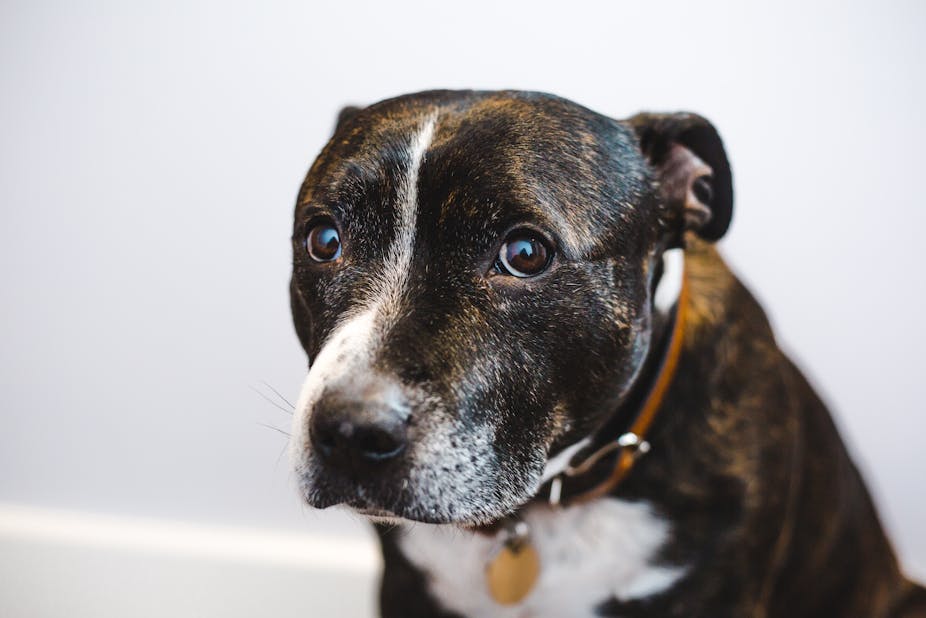Humans weren’t the only beings doing it tough with mental health issues during the pandemic. Our pets suffered too – particularly dogs, who are known to pick up on and share our own anxiety and stress. In 2022 owners reported increased fear in their dogs towards both other dogs and unfamiliar humans, as well as general anxiety being outside their home and travelling in cars, compared to before the pandemic.
This was particularly marked in puppies raised during the pandemic. They missed out on obedience training classes, socialising with other dogs and exploring the human world. Now the lockdowns are over, many puppy owners have returned to the office. Those puppies who enjoyed the 24/7 attention during their early development now have to get used to being left alone for long periods. This has led to a generation of anxious dogs.
We tend to think of dogs as irrepressible – all wagging tails and chasing sticks, they are generally considered confident and happy animals. But this is not always the case. A survey in 2019 looked at more than 4,000 dogs across 16 different countries, and found anxiety to be the most common behavioural issue, with 44% of all the dogs having anxiety.
I am not here to bring you bad news, but advice for helping these anxious pooches. Why not try dog sports? Here’s how they can help.
Why dog sports are so effective
A dog’s life is not always as fun-filled as they’d like. Every dog owner has had that day they’re running late, but still need to take the dog out. You have to hurry them past a particularly smelly lamppost or squirrel-filled tree. Dogs aren’t always able to enjoy their natural behaviour such as sniffing, chasing or digging. They often have to be kept on a short lead which allows minimal interactions with other dogs.
Dog sports allow dogs to make the most of their natural instincts. Flyball, for example, involves dogs working as part of a team to gallop over hurdles to retrieve a ball and race back to the start line.

Freedom from the lead is a key aspect of dog sports. The stress-busting benefits of running for humans are well known and dogs are no different. Physical exercise can help to relieve their stress and anxiety. There are groups and classes for all types of sports and activities to suit any dog. Does your dog love to sniff? Try scent work. If your dog likes to run give agility training a go. For dogs who can’t resist chasing, there’s lure coursing.
A recent study from Tufts University, Massachusetts and the Center for Canine Behavior Studies found participation in dog sports can improve dogs’ anxiety. The researchers investigated the effectiveness of treatments used for dog anxiety across 1,308 dogs such as consulting a behaviourist, medications and changes to diet. But taking part in dog sports came out on top.
Making training fun
These sports could also help those COVID puppies. They offer a chance for dogs to socialise and play with other dogs, as well as interact with unfamiliar humans, all while enhancing their learning through positively reinforced training.
The new research also found evidence that reward-based training and mental stimulation help relieve a dog’s anxiety. They are simple strategies that can be implemented at home and out on walks. Reward-based training can be as straightforward as teaching dogs a new command for a food reward. Learning sit, lie down and paw up can help to keep a dog’s brain engaged and alleviate stress.
Dogs who already know the basics can get creative and try canine freestyle (heelwork to music). The researchers suggest other types of mental stimulation including puzzle toys, more playful interaction with the dog, or hide-and-seek games. Allowing them more time to sniff or explore when out on a walk could help dogs relax too.
Group classes for dogs might sound like a luxury but they can be important for their welfare. It’s a way of improving dogs’ quality of life. So whether you have a worried whippet or a nervous newfoundland, signing them up for a canine sport might be the solution.

